AFP
Fri, 2 February 2024
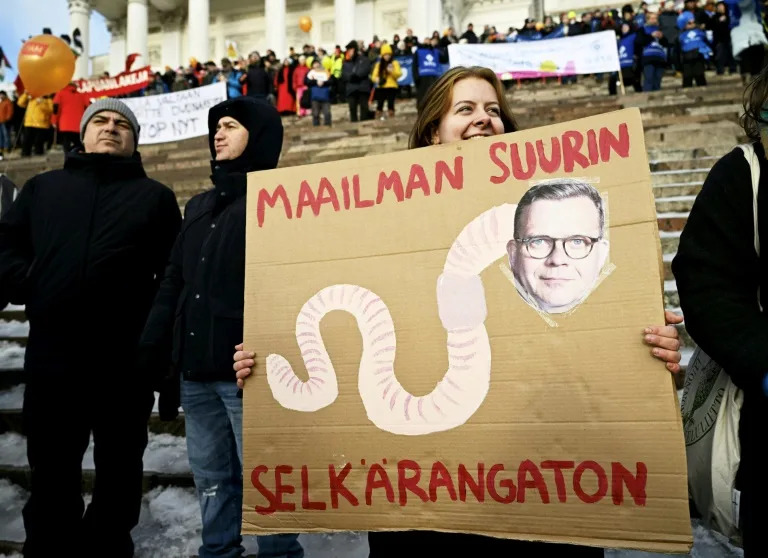
Protester Liisa Huhtala holds a placard showing Finland's Premier Petteri Orpo as a worm and the lettering 'The world's largest invertebrate' (Vesa Moilanen)
Public transport ground to a halt across much of Finland on Friday as part of mass strikes over the government's proposed labour reforms, leaving Helsinki's normally-bustling city centre unusually quiet.
About 300,000 people in a wide swathe of sectors were estimated to be taking part in the strike action, which began on Wednesday when day care workers walked off the job.
Conservative Prime Minister Petteri Orpo has proposed changes to the country's labour market model which critics say would weaken workers' rights, including social benefit cuts and job security, and reduce unions' collective bargaining powers.
Orpo, whose government has argued the country needs an "export-driven labour market model" to boost competitiveness, on Thursday called the mass strikes "excessive and disproportionate".
Unions shut down most air traffic in Finland on Thursday and Friday, forcing national carrier Finnair to cancel 550 flights, affecting 60,000 passengers.
Trains across the country and metros, trams and local trains in the capital were also cancelled on Friday, as well as most buses.
Helsinki resident Marko Tuuminen said he wasn't too bothered by the strike, despite the impact it was also having on the energy sector, schools, healthcare, shops, industry, restaurants, hotels, postal workers and other services.
"They're on strike for good reason. The benefits that have been achieved have to be retained, there is no need to weaken them groundlessly," Tuuminen told daily Ilta-Sanomat on Friday morning.
"The shop close to me has been open. Now I get to exercise walking to work," he said.
- Industry calls new strike -
Some schools in the capital region organised remote lessons for students because of Friday's transport strike, while a taxi company in the city of Tampere said pre-orders had risen eight-fold for Friday morning, public broadcaster Yle reported.
The Industrial Union on Friday announced another strike for February 14-16, which would affect 60,000 workers and bring a large part of Finnish industry to a halt if it goes ahead.
"The Industrial Union will continue to tighten the screw through strikes. We do not accept the government demolishing the structures built to protect workers," it said in a statement.
"The government's measures have nothing to do with boosting employment. This is purely an ideology that enterprises have dictated to the government parties."
Strikes are relatively uncommon in Finland, especially ones involving white-collar workers.
The Confederation of Finnish Industries (EK) told AFP the direct and indirect effects of this week's strikes would result in a loss of around 360 million euros in gross domestic product.
The strike action has primarily been called by the Finnish Confederation of Professionals (STTK), the Public and Welfare Sectors Union (JHL), the Central Organisation of Finnish Trade Unions (SAK), and the Service Union United (PAM).
anh-po/jll/giv
Finnish workers on strike to protest labour reforms, welfare cuts
Thu, 1 February 2024
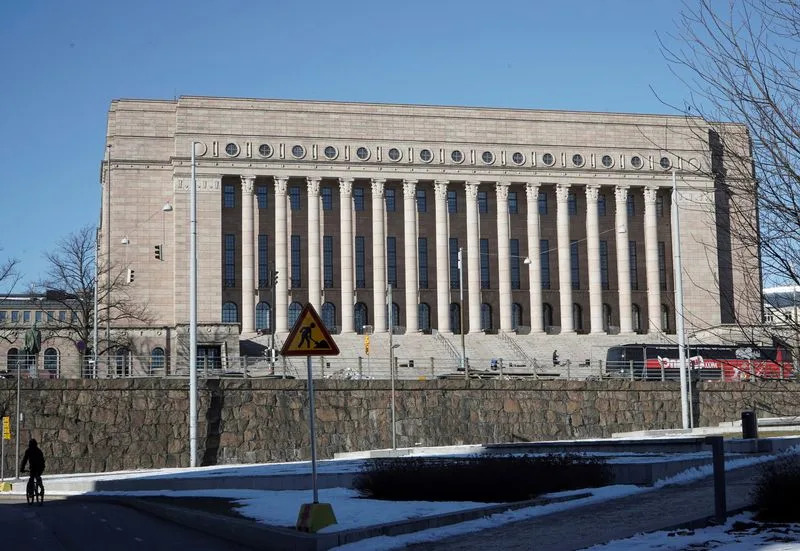
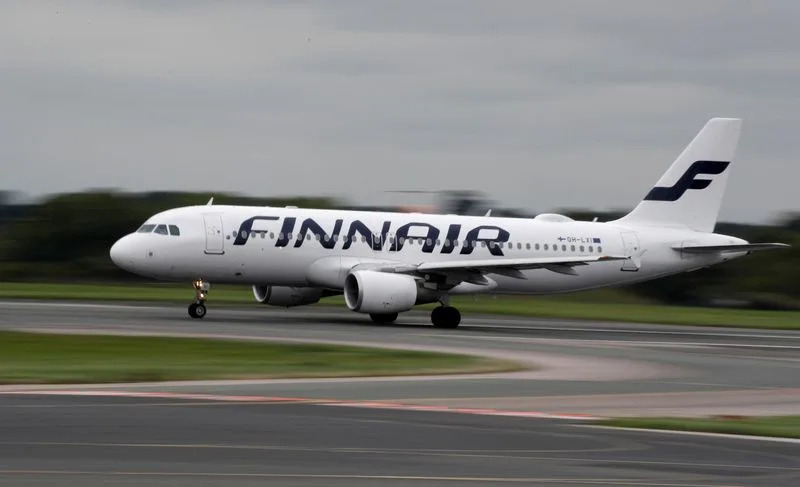
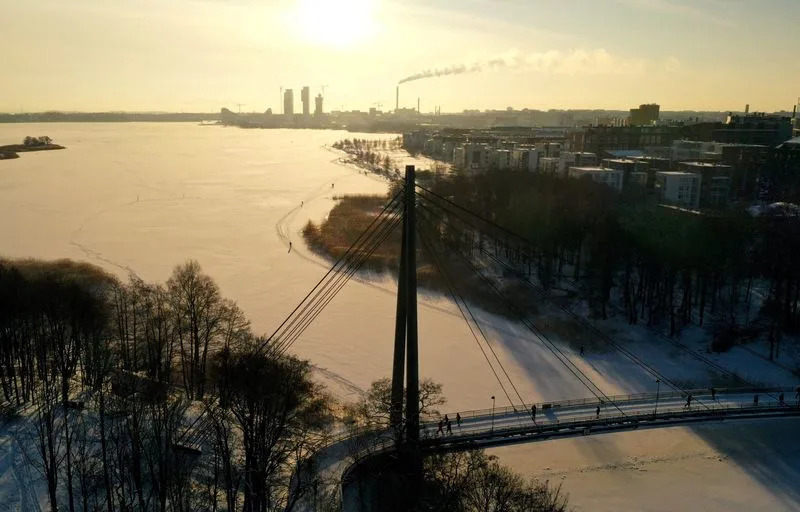
By Essi Lehto
HELSINKI (Reuters) -Some 290,000 Finnish workers began two days of strike action on Thursday to protest against the right-wing government's planned labour market reforms and proposed cuts to social welfare.
Companies and labour unions said the strikes were expected to halt much of Finland's air traffic, hit oil refinery output and close many shops, factories and kindergartens.
"The government's plan is cold-blooded. First, the right to strike will be severely restricted, and then tough cuts are pushed through," Jarkko Eloranta, president of Finland's largest trade union association SAK, told Reuters.
In recent months, labour unions have protested against government plans to favour local work agreements over centralised accords, limit the right to strike, make it easier to terminate work contracts and cut unemployment benefits.
The unions have said they are up for a long fight if needed, threatening to follow up with more strikes if the government, which took office last year, does not back down.
The government has stayed the course however, arguing that Finland needs to boost productivity and cut its fiscal deficit.
Some 13,000 workers gathered for a rally in central Helsinki, among them grocery store employee Niko Pentinmaki, 25, who sat on a bus for four hours to reach the capital with his colleagues.
"The most vulnerable workers might not stay home when they're sick if the first day became unpaid and money already was tight," Pentinmaki said.
Union representative Tarja Furuholm, 61, from Nordea Bank said she was upset that the government and employers were forcing their plans on employees rather than negotiating changes as they had in the past.
"If political parties, who take turns being in power, do the decision-making, work life can become unpredictable," she said.
Booing echoed across Helsinki's Senate Square when Employment Minister Arto Satonen took the stage to defend the government's plans.
Satonen later told Reuters he found the widespread strikes regrettable, but said the government's plans were vital to the future of Finland's welfare system.
"These reforms are absolutely imperative to strengthen the Finnish economy and employment rate, and that is why we need to be determined in pushing them forward," he said.
Top industry lobby group EK and the government have said the changes are needed to bring the Nordic country's economy on par with comparable states such as neighbouring Sweden.
The striking workers comprise 13% of the 2.29 million people employed in Finland, according to official statistics from 2023.
Finnish flag carrier Finnair said on Monday it would cancel some 550 flights due to the strike, while fuel producer Neste's Porvoo refinery will supply less petrol and diesel for approximately a week.
(Reporting by Essi Lehto; editing by Terje Solsvik, Anne Kauranen, Kylie MacLellan, Mark Heinrich and Jan Harvey)
Thousands strike in Finland over labour reform
Anna HOLLINGSWORTH
Thu, 1 February 2024
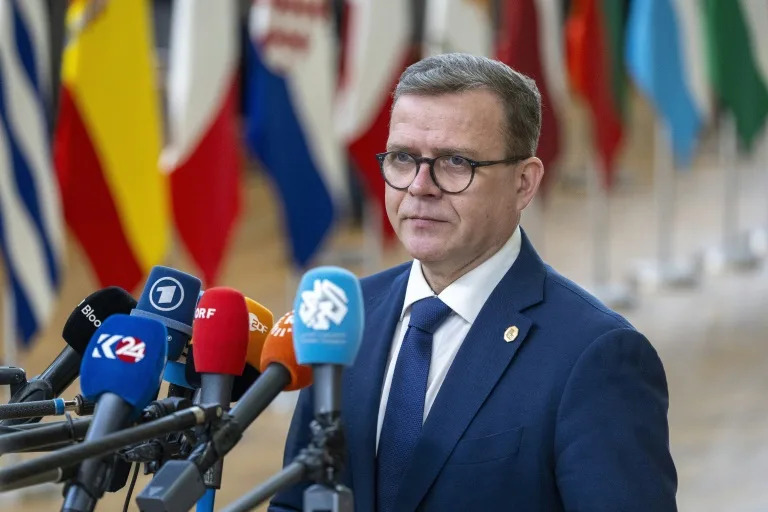
Finland's Prime Minister Petteri Orpo said a major two day strike in his country will damage the economy (NICOLAS MAETERLINCK)
A massive Finnish strike movement kicked off on Thursday, grounding most air traffic and closing workplaces in a protest against proposed government labour reforms that include social benefit cuts.
About 300,000 people are expected to take part in the two days of strike action.
With air traffic widely disrupted, national carrier Finnair has cancelled 550 flights, affecting 60,000 passengers.
Trains across the country and metros, buses and trams in the capital will grind to a halt on Friday, while various unions called for stoppages in the energy sector, schools and healthcare services.
Industry, restaurants, hotels, postal workers and other retail sectors and services are also affected.
A protest called by the Central Organisation of Finnish Trade Unions (SAK) gathered around 13,000 people in Helsinki on Thursday, police said.
"The biggest problem is that they are trying to weaken the unions' powers to negotiate the (collective) agreements which are usually done by the employers lawyers and the unions' lawyers," 30-year-old demonstrator Henri Mertto, who works as a ship crewman, told AFP.
Like its Nordic neighbours, Finland is known for its generous welfare model, which offers strong protection and benefits for employees.
But conservative Prime Minister Petteri Orpo's coalition government has argued the country needs an "export-driven labour market model" to boost competitiveness.
Unions have vowed to paralyse the country to force the government to back down.
"Strikes of this magnitude, that will cause great losses to the Finnish economy in a difficult economic situation, are excessive and disproportionate," Orpo told Finnish news agency STT in Brussels where he attended a European Union summit.
The Confederation of Finnish Industries told AFP the strikes would result in a loss of around 360 million euros for gross domestic product.
Tiina Ivakko, head of a Helsinki daycare centre, told AFP many of her employees didn't show up for work on Thursday and parents kept their kids at home.
"We have, on a normal day, 300 children and a staff of over 50. We have had very few children, about 30, 40, and for staff we have about half of what we usually have," she said.
Some travellers went to Helsinki airport in the hope their flight would be among the few taking off.
"My flight looks like it's going to fly ... but if not then I don't know what I'm going to do. Maybe take a taxi back home and go to work," Niklas Sinisalo, an engineer, told AFP.
He was not bothered by the inconvenience, saying the strike was "for a good cause."
Many supermarkets remained open but shorter opening hours and product shortages were expected toward the end of the day.
- Weaken employees rights -
Among the planned reforms is a change of the rules for collective bargaining negotiations.
Proposed cuts to social benefits would include making the first day of sick leave unpaid and cutting earnings-related unemployment benefits, with the amount decreasing the longer the period of unemployment lasts.
There would also be restrictions on the right to strike and greater rights for employers to negotiate agreements locally.
Markku Sippola, a senior lecturer in social sciences at the University of Helsinki, said the reforms constituted "a very significant change".
"They will weaken the employee's position in terms of both unemployment security and protection against unjustified dismissal and the right to strike," he told AFP.
Pekka Ristela, head of international affairs at SAK, said the government proposals would "weaken the livelihoods of especially low-income employees who become unemployed".
Merja Hyvarinen, who attended Thursday's demonstration wearing a hi-viz vest from the Public and Welfare Sectors Union, said she was worried what the proposed changes would mean for her two children.
"If the government's changes are realised, they'll have a rocky road ahead at work in the future."
Strikes are relatively uncommon in Finland, especially ones involving white-collar workers.
anh-po/tw



By Essi Lehto
HELSINKI (Reuters) -Some 290,000 Finnish workers began two days of strike action on Thursday to protest against the right-wing government's planned labour market reforms and proposed cuts to social welfare.
Companies and labour unions said the strikes were expected to halt much of Finland's air traffic, hit oil refinery output and close many shops, factories and kindergartens.
"The government's plan is cold-blooded. First, the right to strike will be severely restricted, and then tough cuts are pushed through," Jarkko Eloranta, president of Finland's largest trade union association SAK, told Reuters.
In recent months, labour unions have protested against government plans to favour local work agreements over centralised accords, limit the right to strike, make it easier to terminate work contracts and cut unemployment benefits.
The unions have said they are up for a long fight if needed, threatening to follow up with more strikes if the government, which took office last year, does not back down.
The government has stayed the course however, arguing that Finland needs to boost productivity and cut its fiscal deficit.
Some 13,000 workers gathered for a rally in central Helsinki, among them grocery store employee Niko Pentinmaki, 25, who sat on a bus for four hours to reach the capital with his colleagues.
"The most vulnerable workers might not stay home when they're sick if the first day became unpaid and money already was tight," Pentinmaki said.
Union representative Tarja Furuholm, 61, from Nordea Bank said she was upset that the government and employers were forcing their plans on employees rather than negotiating changes as they had in the past.
"If political parties, who take turns being in power, do the decision-making, work life can become unpredictable," she said.
Booing echoed across Helsinki's Senate Square when Employment Minister Arto Satonen took the stage to defend the government's plans.
Satonen later told Reuters he found the widespread strikes regrettable, but said the government's plans were vital to the future of Finland's welfare system.
"These reforms are absolutely imperative to strengthen the Finnish economy and employment rate, and that is why we need to be determined in pushing them forward," he said.
Top industry lobby group EK and the government have said the changes are needed to bring the Nordic country's economy on par with comparable states such as neighbouring Sweden.
The striking workers comprise 13% of the 2.29 million people employed in Finland, according to official statistics from 2023.
Finnish flag carrier Finnair said on Monday it would cancel some 550 flights due to the strike, while fuel producer Neste's Porvoo refinery will supply less petrol and diesel for approximately a week.
(Reporting by Essi Lehto; editing by Terje Solsvik, Anne Kauranen, Kylie MacLellan, Mark Heinrich and Jan Harvey)
Thousands strike in Finland over labour reform
Anna HOLLINGSWORTH
Thu, 1 February 2024

Finland's Prime Minister Petteri Orpo said a major two day strike in his country will damage the economy (NICOLAS MAETERLINCK)
A massive Finnish strike movement kicked off on Thursday, grounding most air traffic and closing workplaces in a protest against proposed government labour reforms that include social benefit cuts.
About 300,000 people are expected to take part in the two days of strike action.
With air traffic widely disrupted, national carrier Finnair has cancelled 550 flights, affecting 60,000 passengers.
Trains across the country and metros, buses and trams in the capital will grind to a halt on Friday, while various unions called for stoppages in the energy sector, schools and healthcare services.
Industry, restaurants, hotels, postal workers and other retail sectors and services are also affected.
A protest called by the Central Organisation of Finnish Trade Unions (SAK) gathered around 13,000 people in Helsinki on Thursday, police said.
"The biggest problem is that they are trying to weaken the unions' powers to negotiate the (collective) agreements which are usually done by the employers lawyers and the unions' lawyers," 30-year-old demonstrator Henri Mertto, who works as a ship crewman, told AFP.
Like its Nordic neighbours, Finland is known for its generous welfare model, which offers strong protection and benefits for employees.
But conservative Prime Minister Petteri Orpo's coalition government has argued the country needs an "export-driven labour market model" to boost competitiveness.
Unions have vowed to paralyse the country to force the government to back down.
"Strikes of this magnitude, that will cause great losses to the Finnish economy in a difficult economic situation, are excessive and disproportionate," Orpo told Finnish news agency STT in Brussels where he attended a European Union summit.
The Confederation of Finnish Industries told AFP the strikes would result in a loss of around 360 million euros for gross domestic product.
Tiina Ivakko, head of a Helsinki daycare centre, told AFP many of her employees didn't show up for work on Thursday and parents kept their kids at home.
"We have, on a normal day, 300 children and a staff of over 50. We have had very few children, about 30, 40, and for staff we have about half of what we usually have," she said.
Some travellers went to Helsinki airport in the hope their flight would be among the few taking off.
"My flight looks like it's going to fly ... but if not then I don't know what I'm going to do. Maybe take a taxi back home and go to work," Niklas Sinisalo, an engineer, told AFP.
He was not bothered by the inconvenience, saying the strike was "for a good cause."
Many supermarkets remained open but shorter opening hours and product shortages were expected toward the end of the day.
- Weaken employees rights -
Among the planned reforms is a change of the rules for collective bargaining negotiations.
Proposed cuts to social benefits would include making the first day of sick leave unpaid and cutting earnings-related unemployment benefits, with the amount decreasing the longer the period of unemployment lasts.
There would also be restrictions on the right to strike and greater rights for employers to negotiate agreements locally.
Markku Sippola, a senior lecturer in social sciences at the University of Helsinki, said the reforms constituted "a very significant change".
"They will weaken the employee's position in terms of both unemployment security and protection against unjustified dismissal and the right to strike," he told AFP.
Pekka Ristela, head of international affairs at SAK, said the government proposals would "weaken the livelihoods of especially low-income employees who become unemployed".
Merja Hyvarinen, who attended Thursday's demonstration wearing a hi-viz vest from the Public and Welfare Sectors Union, said she was worried what the proposed changes would mean for her two children.
"If the government's changes are realised, they'll have a rocky road ahead at work in the future."
Strikes are relatively uncommon in Finland, especially ones involving white-collar workers.
anh-po/tw
No comments:
Post a Comment